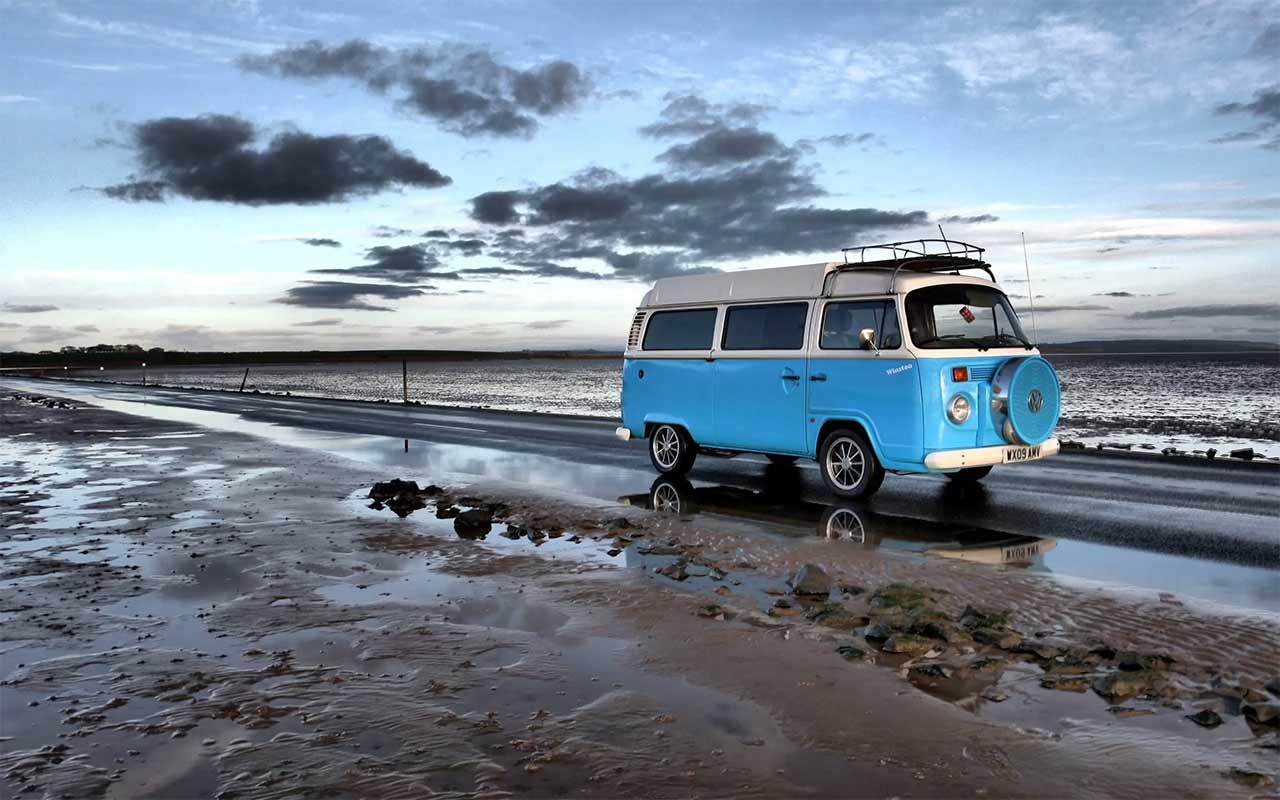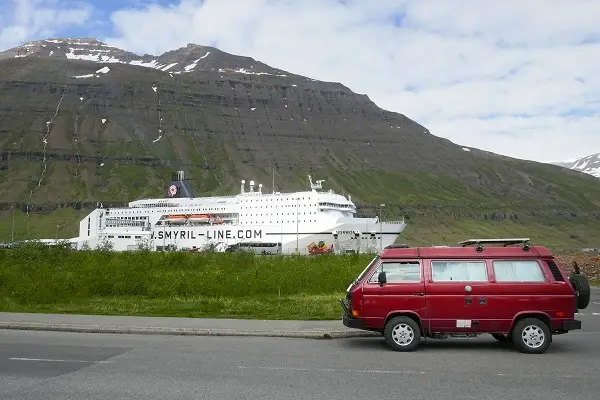If you’re planning to travel further afield in your camper, then taking the ferry can be a great option for getting you and your campervan across the water, whether you’re travelling from the UK to France, Ireland, or even down to Spain.
There are some things you’ll need to be aware of when taking your campervan on a ferry, but we’ve put this quick guide together to help you navigate these potential issues, so your journey is plain sailing.
What to Check Before Taking Your Campervan on a Ferry
There are a few different checks you’ll need to do before booking your camper onto a ferry crossing, and some things you’ll want to note down before you arrive for your voyage, to make sure the trip goes smoothly.
Gas Safety: Campervans on Ferries
It’s important to take extra care of the gas system on your camper when travelling by ferry, as any issues which arise will be a lot harder to deal with while on the seas.
You’ll likely receive safety information from the ferry operator at the time of booking, and it’s usually available on their websites, but it’s very important that you turn off your gas completely, both due to international safety regulations and the safety of everyone on the boat, including yourself.
If in doubt, get in touch with the ferry company before you set off and ask them what the rules are for bringing gas aboard.
Click here if you want more information about gas safety for campervans.

Measure Your Camper Before You Travel by Ferry
When booking your campervan onto a ferry, you’ll need to measure the dimensions of your van, so that the ferry company can determine the correct price for your journey.
To get the correct length measurement of your van, the measurement should include any fixtures, such as a towbar or bike rack, not only the main body of your van. Not including these extra elements may cause issues when you arrive at the ferry port to board, so it’s important to include them while you’re doing your measuring.
Try to be as accurate as possible, because if you underestimate the length of your van, you will have to pay an additional per-metre charge.
You may find that measuring the height of your camper is also required when making the booking. If it is, you’ll need to include things like roof racks, roof bars, satellite dishes or anything else which adds height to your camper.
If you’ve got a high-top camper, or it’s got raised-up suspension, you’re familiar with the height of your vehicle already due to getting into car parks and other height-restricted areas, but it’s still worth double-checking.

The width of your van is usually less important when booking your ferry as most campervans have a similar width. However, occasionally this can vary, so we recommend making a note of the width in case you do end up needing it – you’ve already got a tape measure out, so you may as well!
Make Sure You’ve Got EU Driving Cover
While you’re already getting things booked and organized for your trip, take the time to ensure you’ve got proper EU driver insurance which will cover you when you and your campervan arrive at your destination.
Just Kampers Insurance can provide you with cover to travel to all EU countries and beyond. Some of our policies include this cover free of charge, depending on where you’re going and how long for.
If you take out optional breakdown cover from Just Kampers Insurance we’ll be able to get you back on the road (or back home) should the worst happen while you are away.
Click here to find out more about EU Driving Cover, or call our friendly team of experts on 01256 444546.

Where Can You Travel by Ferry in a Campervan?
One of the joys of owning a campervan is that you’re free to go wherever and whenever you want, within reason! There’s a very large number of ferry services which run between the UK and across mainland Europe, whether it’s a trip across the Irish Sea or island hopping in the Mediterranean, you can do it all in your campervan.
A common trip that’s often taken by campervan drivers is the Channel ferry to enter mainland Europe, via France. This is a good alternative to the Channel Tunnel, which, although is quicker, can be more costly.
There are also ferries which can take you from Newcastle to Amsterdam, from Wales to Ireland, or from Plymouth to Spain. You might be surprised by the number of destinations you can reach from the UK by ferry, so it’s definitely worth taking a look at when you’re planning your next campervan adventure.
Booking In Advance
One of the most important things to know about ferry travel is the benefits of booking early. Ferries can often get booked up fairly quickly, especially in peak seasons, so booking early will help you avoid disappointment. You’re also likely to get the best prices when you book in advance, as the costs of ferry travel can increase as it gets closer to the departure date.
Booking in advance will also give you plenty of time to plan your adventures, measure up your campervan, and action any safety precautions you’ll need to take for your ferry journey.
Camping On Board or Booking a Cabin
On short ferry trips, such as the ferry from Dover to Calais, cabins won’t be available to book but don’t worry, there’s still plenty to keep you entertained. On longer journeys however, you can book cabins to rest in, which is especially needed on long ferries such as the 24 hours ferry from Portsmouth to Bilbao.
There are several options that may be available on your chosen ferry including cabins, suites, dormitories, and sleeper chairs.
Usually on a ferry you’ll have to leave your camper when you set sail, and won’t be able to return to the vehicle deck until you arrive. However, there are a few ferry services across Europe which will allow you to stay in your van for the entirety of your journey.
These tend to have low availability on the few ferries that do offer this as an option, which is another great reason to book early and make it known that you wish to camp on board.
This does give you a cheaper option than sleeping in a cabin, but the ferry vehicle decks can be very loud and narrow.
What Not To Bring
Unlike travelling by plane, you can carry most things in your van onto a ferry. You can carry most food and drink on ferries and there aren’t restrictions on the amount of liquids you can carry.
However, there are some goods that are considered dangerous, so they can’t be taken on board. One common item you may find yourself mistakenly trying to smuggle on a ferry is excess petrol or fuel. These are considered ‘dangerous goods’, no matter how safely they’re stored. You can bring empty petrol cans though, so if you use up the fuel in them and bring the empty cans with you, you’ll be able to refill them on the other side!
Gas for cooking on the other hand is allowed on board, but as mentioned above you’ll need to pay attention to the safety regulations aboard the ferry and ensure that your gas is switched off.
The majority of ferry companies will allow you to bring up to three gas canisters, and you should check with the ferry operator if you’re planning on carrying multiple types of gas.
If you have a fridge in your campervan, you may want to either empty your fridge and turn it off or ask for an electricity connection to your van. The majority of companies will either be able to supply you with a supply of electricity for a small fee or no extra charge. Again, this is worth checking before you travel so that you can plan accordingly.
Do I Need To Bring Food?
On most ferries there will be somewhere you can buy food and drinks from, such as a restaurant, café, or snack bar. These are good for keeping you occupied on your journey but can often be quite expensive, so if you want to save a bit of money on the way, then it’s worth bringing your own food and drink.
This may be easier on shorter journeys where you won’t need as much food and won’t be away from your camper for as long, but bringing a portable cool bag or well-stocked backpack can help keep you and your family fed and watered during your journey.
Enjoy your journey!
Travelling by ferry isn’t necessarily the fastest way to get from A to B, but it can make for a really enjoyable journey. The same can be said for a campervan, too, so crossing the sea in your camper by ferry can be a fantastic start to your adventures, whether you’re popping across to France for a quick trip, or heading down to Spain for the start of an epic road trip.
We hope this guide has helped you feel more prepared, and more excited, to take your camper on the ferry next time you’re heading to Ireland or Mainland Europe.
